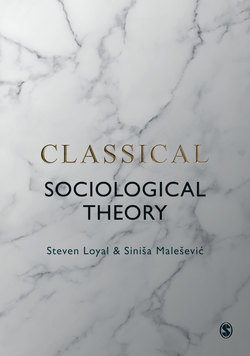Читать книгу Classical Sociological Theory - Sinisa Malesevic - Страница 15
На сайте Литреса книга снята с продажи.
The Ionian and Italian Schools of Natural Philosophy
ОглавлениеIn the sixth century there emerged two schools of natural philosophy, the Ionian and the Italian. The Ionian or Milesian School is represented by Thales, Anaximander and Anaximenes, who were all natives of the same city of Miletus. In their philosophies they sought something permanent and persistent through the chaos of apparent change. For Thales it was water, for Anaximenes it was air, while for Anaximander it was not a substance as such but the balance of opposite qualities – hot and cold, wet and dry. By contrast, the Italian School was associated with the name of Pythagoras. An early form of social movement, it sought to revive a pre-existent social order whose virtues centred on austere simplicity in the individual and social cohesion within the group. Pythagoreans argued that the soul passes through various reincarnations and, as the higher, exalted part of humans, remained imprisoned in the body.
Further intellectual influences on Plato included the arguments of Heraclitus (544–484 bce) for whom two principles were central: everything was born of strife, and everything was in constant flux.
The Ionian rationalists and Pythagoreans had focused on the natural world rather than the values of the human community. It was not until the close of the fifth century bce that a philosophy of human conduct based on a systematic co-ordination of knowledge and theory emerged. This arose from the work of the Sophists and Socrates. Central to the former’s perspective was the opposition between the concept of physis (nature) and nomos (convention). They questioned conventional beliefs and the notion of nomos, meaning both ‘law’ and ‘custom’. For the Sophists, the multiplicity of nomoi in different cultures revealed a diversity that suggested that local customs were the product of tradition rather than of abstract unchanging principles of right and wrong. Laws and moral codes were not divine, but human made and imperfect. Thus for Protagoras, the central figure in the Sophist school, ‘man was the measure of all things’.
Socrates (470–399 bce) was undoubtedly the greatest influence on Plato’s thinking and, as we noted above, it still remains unclear where the former’s work ends and the latter’s begins. Socrates was the son of a middle-class stonemason and a midwife who, as an Athenian citizen, fought as a hoplite soldier in the Peloponnesian War. His thinking delves into questions concerning action, morality and the best way to live for humans. According to Socrates, individuals cannot talk about acting wisely, justly or well, unless they know what wisdom, justice and goodness are in the first place, and this needs to be established. The best way to develop ideas was through the give and take of conversation – the dialectic – and the best way to educate people was to ask them a series of what appear innocuous questions (the method of elenchus). This usually began by pressing individuals for a definition of a term until they recognised that they did not really have an adequate answer.
A sharp critic of Athenian democracy as an ideal and actuality, Socrates argued that democratic government, in which anyone’s opinion counted as much as anybody else’s, could be swayed by rhetorical display within a volatile assembly. Just as an individual would ask a doctor about their health, so only he or she who knows about governing should govern. Taking the example of the useful crafts, Socrates argued that the arête (skill) of a shoemaker and what made them good at their job depended first and foremost on the knowledge of what a shoe was and what its use was. Given a proper understanding of the end, knowledge of the means would follow. If there was any legitimate sense in which individuals could talk about arête there must be an end or function which all humans have to perform. The first task was to discover what the function of man was.
